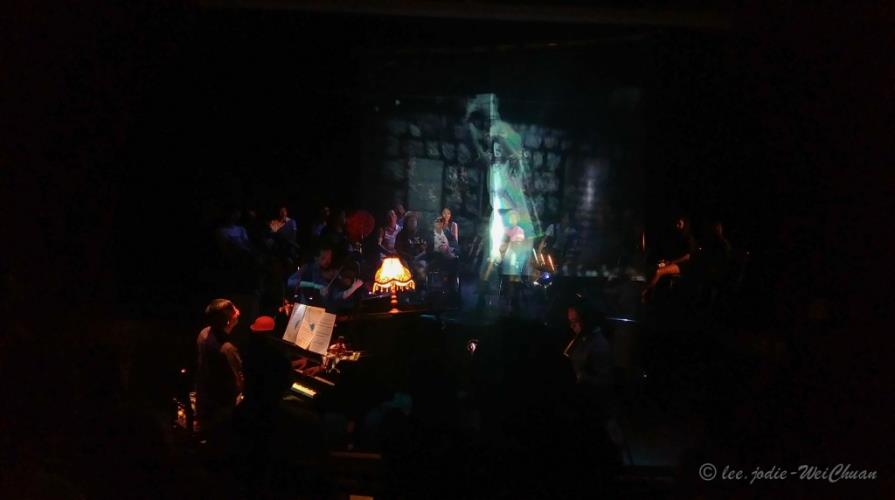Independent exhibition organiser and producer in art promotion and cross-boundary art creation. Worked in Macao government organizations to promote art since 1998, planned programmes like performance art festivals, movie festivals and other festivals. Planned multiple trans-country art exchange events as independent producer since 2009.

Picnic in the Cemetery Performance in Tainan Photo courtesy of lee.jodie-WeiChuan
Most Macao troupes plan their annual projects according to their year plans or individual applications. In general, new productions can land more sponsors, and because most troupes are amateurs, the time for people involved in the production is shorter. When there’s an opportunity to produce a performance, people hope to try new things.
Hong Kong and Macao troupes produce many new plays every year. Plays with more number of performances or those that can restage multiple times are mainly of public taste. In Macao there are few productions that can be restaged multiple times. I have started as independent producer since 2009, and I have always hoped to produce a play that can be restaged on and on. But there is no such condition in Macao, so the only way is to seek suitable audiences outside instead of pleasing the existing ones. For me, the biggest change is that I no longer produce for a certain performance schedule. There are very few performance venues in Macao that we have to conceptualise the plays after we find a venue. But I think the products are more important. Therefore, for the past few years, I focused more on discussing production directions with artists but not produce just for the sake of producing. I only did four plays in the past six years, including Playing Landscape, DewDrop in the City, Travelling Hometown and Picnic in the Cemetery. I spent two years to conceptualise and produce each play.
All four plays were small or middle-scaled productions, ranging from two to four actors. All backdrops and props were designed according to “tour-ability” so that we don’t have to spend on props and large-scale productions. The objective is to control cost and focus resources on personnel, allowing people involved in creation and production to participate full-time over a period of time. At the same time sufficient creation time is allowed for creators to play more freely.
The next step is to enhance the technique of participants in all positions through repeated performances. Thus, for me, there is no “restage” or so-called “long run”. There are only concepts for “previews” and “premiers”. As long as we excel a play, there will be audiences who appreciate it anywhere. 90% of our plays are staged overseas since 2009, with over 50 performances each for Playing Landscape, DewDrop in the City and Picnic in the Cemetery.
We participated in the Edinburgh Festival Fringe last year with Playing Landscape, Picnic in the Cemetery and Puzzle the Puzzle, scoring multiple five-star reviews. Picnic in the Cemetery was regarded as the must-see show by the British theatre guidebook, and Playing Landscape was even nominated for the Asian Art Award. This gave us enormous encouragement and proved that Macao plays are no longer amateur.
Picnic in the Cemetery was played for the 52nd time in Porto recently. Musicians Njo Kong-Kie and Hong Iat-U played in all 52 showings. Njo is a young local musician, and being able to perform for the same play 52 times in two and a half years is an extremely rare training opportunity. His maturity is reflected in this year’s performances. In addition to techniques, the more important thing is the growth of his performance mentality.
The biggest problem facing Macao is over-production. Affected by the mode of sponsor, troupes are constantly making new plays that last one to two showings, leaving no time for the play and the creators to grow. If we wish for the cultural industry to develop, we should allow time for plays and playmakers to enhance the products. Creators should also reconsider the aim of creation and the way it is made, reduce the quantity of production and raise the quality of performances, allowing more space for themselves to perfect a play.